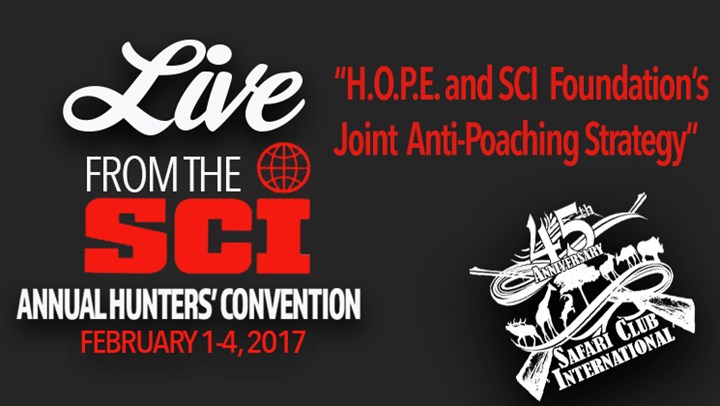
by Karen Mehall Phillips - Saturday, February 4, 2017

I once wrote that if one was asked to name the top common denominator among all wildlife conservation groups, the answer is that they are all made up of hunters—conservationists who put wildlife first. Think about it: From the National Rifle Association and Safari Club International to the Rocky Mountain Elk Foundation and every group in between, their membership ranks are filled with hunters all driven to protect hunting and our renewable wildlife resources. For today’s example, look no further than SCI and its 45th Annual Hunters’ Convention seminar “H.O.P.E. and the SCI Foundation’s Joint Anti-Poaching Strategy” that drew show attendees including Uganda’s Minister of Tourism, Zambia’s director of National Wildlife and Parks and reps from Tanzania, Namibia and Zimbabwe.
Short for Humanitarian Operations Protecting Elephants, H.O.P.E. is headed by NRAHLF.org contributor Catherine Semcer—who as the group’s COO represented hunters worldwide in May 2016 in the national "Hunting is Conservation" debate against anti-hunting extremist and HSUS front-man Wayne Pacelle, repeatedly hitting on the topic POACHING IS NOT HUNTING, covered regularly by NRAHLF.org contributors.
H.O.P.E. and SCI teamed up two years ago to improve the effectiveness of anti-poaching efforts in Africa in support of the SCI Foundation’s goal of fighting poaching in the United States and abroad. So what’s the goal of these two hunter-conservationist groups? As explained by co-presenters Semcer and SCI Foundation Acting Director of Conservation Matt Lewis, their strategic partnership aims to increase human compliance with wildlife law.
Objective No. 1: Increase penalties for wildlife crimes. Tactics include working with state legislators to increase poaching penalties and get wildlife laws revised so the punishment fits the crime.
Objective 2: Make sure cases are prosecuted—and lead to a conviction. In some cases this includes paying for lawyers to assist government prosecutors.
Objective 3: Support H.O.P.E.’s efforts to assist ranger programs and anti-poaching units to enhance training and effectiveness.
Objective 4: Work with states nationwide through legislative action.
Objective 5: Work with U.S. Native American tribes. Because these tribes are sovereign nations, states with reservations have no authority over such lands. The grounds of the White Mountain Apache Tribe in Arizona, for example, are noted for having produced the world record elk, need assistance on the anti-poaching front.
The Bottom Line
As noted by NRAHLF.org contributor Phil Phillips in his article "Poaching is Not Hunting" in March 2016, poaching just may be the single greatest threat to hunting. “In my 30-plus years in the hunting industry,” he said, “one of the most common misconceptions among non-hunters is that poachers are hunters. This gives anti-hunting extremists unjustified ground to stand on as they try and put hunters in a bad light.” In truth, he adds, as America's No. 1 conservationists, hunters are the first to protect and crack down on the exploitation of wildlife. “In 1995 in my home state of Colorado, a poacher—not a hunter—killed a famous trophy bull elk nicknamed Samson with a crossbow in Estes Park, Colo. The outrage from hunters and other residents had profound impact on state wildlife laws. In 1998 Samson's Law was passed, raising fines for the poaching and/or possession of any animal considered trophy-class to as much as $25,000.”
Make sure non-hunters understand: Poachers are criminals. Poaching is illegal and unethical. Poachers are no different from thieves who break into a store to rob a cash register as they trespass, kill and steal animals and fish, often for profit.
E-mail your comments/questions about this site to:
[email protected]
